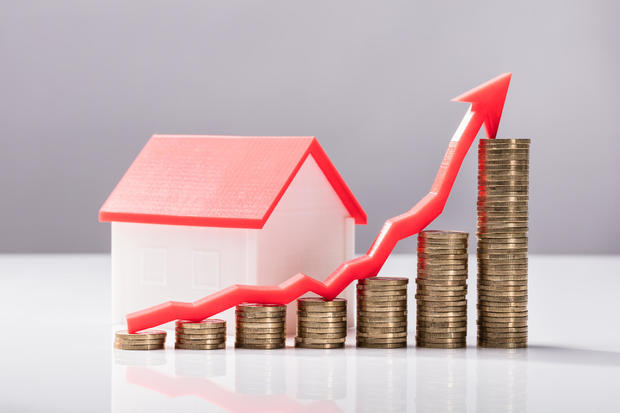How inflation affects your home equity options
Inflation has cooled off slightly, according to the latest numbers. The Bureau of Labor Statistics' Consumer Price Index (CPI) report for April 2023 shows consumer prices dropped below 5% for the first time since June 2021. Unfortunately, the drop wasn't much. Prices are currently at 4.9% — much higher than the Federal Reserve's target of 2%. It has some experts worried that inflation will still plague us for some time to come.
"Inflation has moved beyond sticky at this point and after three months of core CPI hanging above 5%, it's become tenacious," Robert Frick, corporate economist with Navy Federal Credit Union, recently told CBS News.
If you're considering tapping into your home equity for major home repairs, debt consolidation or other expenses, this persistent inflation is something you need to keep in mind.
See how much you could borrow by viewing home equity rates here.
How inflation affects your home equity options
Here's what you need to know if you're thinking of drawing from your home equity when inflation is high.
Higher interest rates
Inflation can impact the interest rate you'll pay on home equity loans and home equity lines of credit (HELOCs). When inflation rises, it costs banks more to lend out money. They pass this cost on to borrowers by raising interest rates on loans and lines of credit. This means if you take out a home equity loan or HELOC during a period of high inflation, you'll likely pay a higher interest rate than you would if inflation were low.
The good news is that with a HELOC, your rate may go down in the future. While home equity loan rates are fixed, HELOC rates are variable and can decrease with the federal funds rate. If you need to borrow from your home equity in an inflationary environment, a HELOC could be the better way to go.
Check out your HELOC options online now.
Greater borrowing ability
When inflation is high, home values tend to increase. Lenders typically allow you to borrow up to 85% of your home equity. Since your home's value plays a role in how much equity you have, higher values mean you might be able to borrow more than you might at other times.
Home equity is calculated by subtracting your home's current market value from your current mortgage balance. For example, say you paid $500,000 for your home and have since repaid $100,000 of your mortgage, bringing the balance down to $400,000. If your home's value is still $500,000, you'd have $100,000 in equity to draw from ($500,000 - $400,000).
But if your home has appreciated to $600,000, you'd have $200,000 in equity ($600,000 - $200,000). The higher your home's value, the more equity you have. So, when inflation is high, you could borrow even more.
This can be useful if you need access to a large amount of funds right away. Credit cards often limit you to under $30,000 and personal loans tend to cap borrowing at $100,000. A home equity loan or HELOC could get you hundreds of thousands of dollars, depending on your home equity and credit score.
Affordability compared to other financing options
While inflation can increase your borrowing costs, home equity loans and HELOCs are still more affordable than other financing options if you need funds now.
Average credit card rates currently hover around 20%, and personal loan rates are anywhere from 8% to 36%. Home equity loan and HELOC rates, by contrast, are closer to 7% to 8%. That can save you considerable money over the course of repaying your loan.
Plus, if you use your home equity funds for IRS-approved home improvements and repairs, you could potentially deduct the interest come tax filing time. "Interest on home equity loans and lines of credit are deductible only if the borrowed funds are used to buy, build, or substantially improve the taxpayer's home that secures the loan," the IRS explains. "The loan must be secured by the taxpayer's main home or second home (qualified residence), and meet other requirements."
The bottom line
A high inflation rate can increase interest rates on home equity loans and HELOCs, but it can also increase your home's value, allowing you to borrow more if you need a large amount of money. As a homeowner, it's important to keep an eye on inflation and compare your borrowing options so you can make informed decisions to get the most out of your home equity and secure the financing you need.




